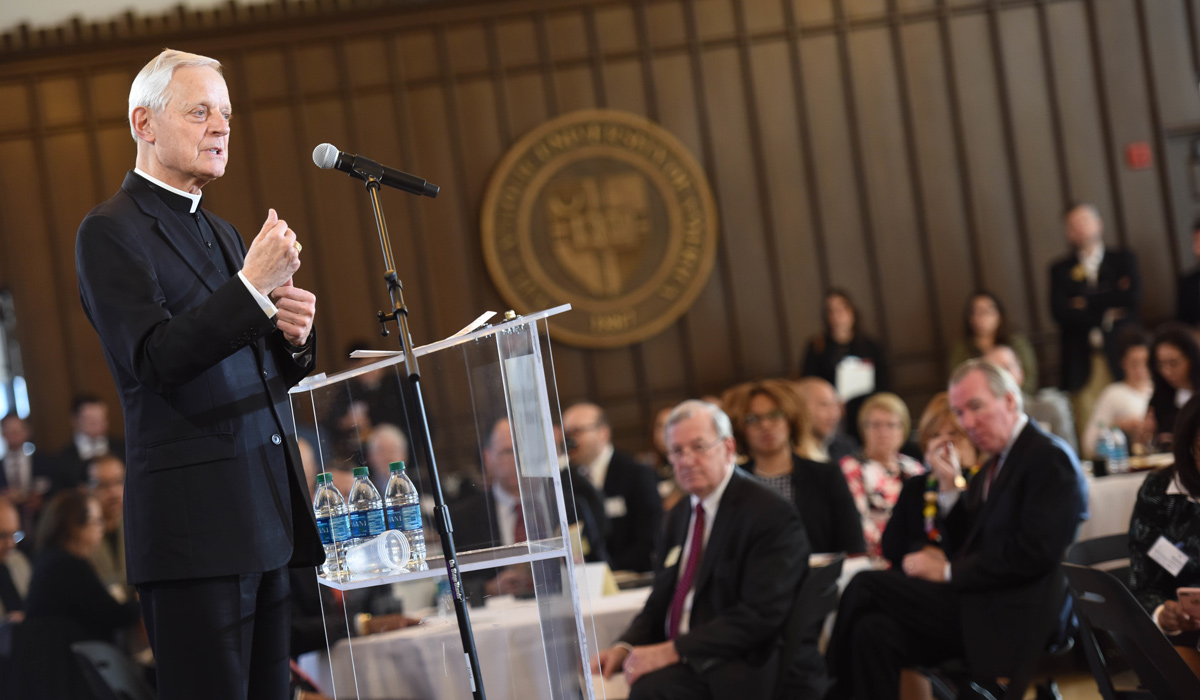

More than 200 leaders from business, government, civic groups, and faith-based organizations gathered at The Catholic University of America on Feb. 28 to kick off a partnership that promises to bring jobs and economic prosperity to inner city communities in the Washington, D.C., area.
The Tim and Steph Busch School of Business and Economics has partnered with the Initiative for a Competitive Inner City (ICIC) to launch the Inner City Capital Connections (ICCC) program in Washington, D.C.
Cardinal Donald Wuerl gave welcoming remarks. In his role as both chancellor of Catholic University and as archbishop of Washington, he said he was there to offer encouragement, support, and congratulations to all involved in a program that will directly benefit the people he serves.
ICCC is a national program designed to help small businesses in economically distressed areas build capacity for sustainable growth in revenue, profitability, and employment. The program achieves these goals by means of a comprehensive curriculum that combines targeted executive education sessions with local coaches/mentors, and then connects participants with potential capital sources and a broad professional network.
“One of the reasons this is such a significant program is that it takes the best of Catholic social teaching and the best of good business and puts them together,” said Cardinal Wuerl. “This is the best of theory and practice at work.”
“The initiative highlights the idea of subsidiarity by building on what is already there and enhancing it,” he said, “It empowers people where they are and encourages personal initiative.”
ICCC is the only program in the country that educates inner city small businesses about various forms of capital and matches them with appropriate capital providers. Since 2005, small business participants have raised more than $1.4 billion in debt and equity capital and have created more than 12,000 jobs.
“This is our first partnership with an academic institution, and we believe it could become a transformational model for business schools in America’s urban communities,” said Steve Grossman, CEO of ICIC, who was a speaker at the breakfast event held in Father O’Connell Hall.
“The Busch School of Business and Economics was founded on the idea that the human person — made in the image and likeness of God — must be at the heart of business,” said University President John Garvey. “Drawing on the Church’s rich social doctrine, we teach our students that the purpose of business is not simply to make a profit. Business must serve the common good of society,” he said in explaining why he is so pleased by this partnership.
The goal of the ICCC Washington, D.C., initiative is to select 75 to 100 small businesses to participate in the 2017 program cohort.
Keynote speaker Pedro Alfonso, an alumnus of ICCC, encouraged all in attendance to spend time thinking about the small businesses in their communities and nominate them for the program that will commence in September 2017.
Alfonso is the chairman and CEO of Dynamic Concepts, Inc., a Washington, D.C., company he founded in 1979 that provides technical and telecommunications support services. He participated in the ICCC program in 2006 and again in 2012. As a result, he says, he has created 495 new local jobs since 2006.
“When I first participated in the program, I had a deep desire to grow,” said Alfonso. “The program was a game changer for my business, it helped me develop and implement a true business vision and strategic plan.”
The ICIC partnership will be managed through the Arthur and Carlyse Ciocca Center for Principled Entrepreneurship at the Busch School. “Small businesses are the backbone of the American economy,” said Bob Keith, co-founder of the Ciocca Center, who is directing the partnership and the launch of the ICCC program for the University. “They account for 74% of the jobs in economically distressed neighborhoods, and this program will provide the rocket fuel for these small businesses,” he said.
“Catholic University is an anchor in [D.C.’s] Ward 5,” said Hyacinth Vassell, ICCC director. “The University is a connection to the community, doing God’s work by helping people thrive. This partnership will be a powerful way to engage people in social good that will have profound regional impact.”